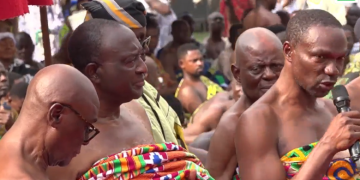The Asantehene, Otumfuo Osei Tutu II, has issued a stern warning against the misuse of the revered “Ntamkɛseɛ” or Great Oath, underscoring its deep historical significance and the severe consequences of its abuse.
The warning came during a Kumasi Traditional Council meeting at the Manhyia Palace, where Otumfuo delivered a verdict against the Chief of Wirempe, Nana Opia Mensah II, who was found guilty of violating the sacred oath.
In his address, Otumfuo Osei Tutu II reminded the council of the profound origins of the “Ntamkɛseɛ,” a vow deeply rooted in the history of the Asante Kingdom. He recounted the emotional turmoil experienced by a past Asantehene, Nana Osei Tutu, whose succession plans were jeopardized as his sister’s first two children died in infancy.
The survival of the third child, attributed to the intervention of the Kingdom’s priest, marked the establishment of the Great Oath—a solemn vow reflecting both the Asantehene’s distress and the relief brought by the child’s survival.
Otumfuo emphasized that the “Ntamkɛseɛ” is far from trivial; it represents the weight of an Asantehene’s lineage and the survival of the Golden Stool’s legacy.
He lamented that the sacred oath, which should be invoked only in the gravest of circumstances, has been increasingly misused by some chiefs, including in the case of Nana Opia Mensah II.
The Asantehene highlighted that the “Ntamkɛseɛ” is traditionally invoked to affirm one’s innocence or rightful ownership in a dispute.
The invocation requires specific rituals before the case is heard by the Asantehene. Importantly, should the person who swears by the oath be found guilty, they face the severe consequence of losing their traditional position.
“The abuse of the Great Oath is not an isolated incident,” Otumfuo Osei Tutu II noted, expressing concern over the frequency with which the oath has been misused in recent years.
He vowed to uphold the sanctity of the “Ntamkɛseɛ” and enforce the traditional consequences in all future cases, ensuring that the oath remains a solemn and respected aspect of Asante culture.
The Asantehene’s warning serves as a powerful reminder of the cultural and spiritual weight carried by the “Ntamkɛseɛ” and the importance of respecting traditional practices that have sustained the Asante Kingdom for generations.
Source: www.kumasimail.com



































































